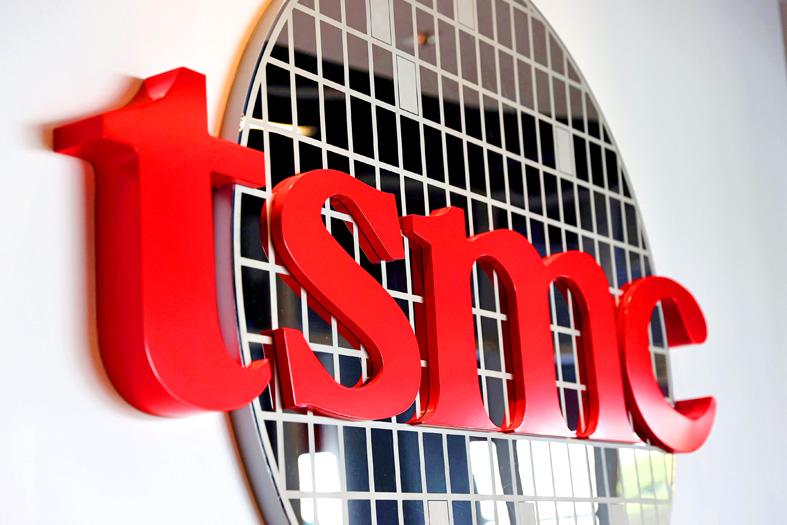Taiwan Semiconductor Manufacturing Co’s (TSMC, 台積電) shares yesterday rose 2.27 percent to the highest since Aug. 12 on media speculation that the world’s biggest chipmaker planned to hike wafer prices by up to 20 percent due to a quarters-long chip crunch and rising manufacturing costs.
The Chinese-language Economic Daily News reported that TSMC had told chip designing customers about raising prices from next quarter by 10 to 20 percent, as the chipmaker aims to maintain its gross margin, which stood at 50 percent last quarter.
The Liberty Times (sister paper of the Taipei Times) yesterday said that TSMC had upped wafer prices by 20 percent for most of its technologies, including 7-nanometer, 12-nanometer, 28-nanometer and 40-nanometer technologies.

Photo: Ann Wang, Reuters
The new prices took effect immediately after customers received the notifications at noon yesterday, the report said.
TSMC and MediaTek Inc (聯發科), one of TSMC’s top clients, could not be reached for comment as of press time last night.
TSMC has been reluctant to raise prices even though its peers, such as United Microelectronics Corp (UMC, 聯電), increased prices on new orders by 10 percent or more early this year amid drastic increases in manufacturing costs.
Responding to investors’ concerns over its pricing strategy, TSMC chief executive officer C.C. Wei (魏哲家) last month said that the “company’s pricing strategy is strategic, and we don’t take an opportunistic approach.”
“We work with our customers closely and we want to help them to be successful while we get a proper return,” Wei said. “So that’s why we are firming up our wafer pricing, and we are confident that we can keep our gross margin at 50 percent or above in the long term.”
A short-term imbalance in the supply chain, driven by a need to ensure supply security, and the structural increases entailed by long-term demand are expected to persist, the Hsinchu-based company said earlier.
TSMC’s capacity would remain tight through next year, fueled by increasing demand for its advanced technologies and specialty technologies used in 5G devices and applications of high-performance computing, it said.
The COVID-19 pandemic has fundamentally accelerated a digital transformation, making semiconductors more pervasive and essential in people’s lives, it added.
TSMC shares have rallied 9.14 percent this year, closing at NT$585 yesterday in Taipei trading.

INVESTIGATION: The case is the latest instance of a DPP figure being implicated in an espionage network accused of allegedly leaking information to Chinese intelligence Democratic Progressive Party (DPP) member Ho Jen-chieh (何仁傑) was detained and held incommunicado yesterday on suspicion of spying for China during his tenure as assistant to then-minister of foreign affairs Joseph Wu (吳釗燮). The Taipei District Prosecutors’ Office said Ho was implicated during its investigation into alleged spying activities by former Presidential Office consultant Wu Shang-yu (吳尚雨). Prosecutors said there is reason to believe Ho breached the National Security Act (國家安全法) by leaking classified Ministry of Foreign Affairs information to Chinese intelligence. Following interrogation, prosecutors petitioned the Taipei District Court to detain Ho, citing concerns over potential collusion or tampering of evidence. The

‘FORM OF PROTEST’: The German Institute Taipei said it was ‘shocked’ to see Nazi symbolism used in connection with political aims as it condemned the incident Sung Chien-liang (宋建樑), who led efforts to recall Democratic Progressive Party (DPP) Legislator Lee Kun-cheng (李坤城), was released on bail of NT$80,000 yesterday amid an outcry over a Nazi armband he wore to questioning the night before. Sung arrived at the New Taipei City District Prosecutors’ Office for questioning in a recall petition forgery case on Tuesday night wearing a red armband bearing a swastika, carrying a copy of Adolf Hitler’s Mein Kampf and giving a Nazi salute. Sung left the building at 1:15am without the armband and apparently covering the book with a coat. This is a serious international scandal and Chinese

Seventy percent of middle and elementary schools now conduct English classes entirely in English, the Ministry of Education said, as it encourages schools nationwide to adopt this practice Minister of Education (MOE) Cheng Ying-yao (鄭英耀) is scheduled to present a report on the government’s bilingual education policy to the Legislative Yuan’s Education and Culture Committee today. The report would outline strategies aimed at expanding access to education, reducing regional disparities and improving talent cultivation. Implementation of bilingual education policies has varied across local governments, occasionally drawing public criticism. For example, some schools have required teachers of non-English subjects to pass English proficiency

TRADE: The premier pledged safeguards on ‘Made in Taiwan’ labeling, anti-dumping measures and stricter export controls to strengthen its position in trade talks Products labeled “made in Taiwan” must be genuinely made in Taiwan, Premier Cho Jung-tai (卓榮泰) said yesterday, vowing to enforce strict safeguards against “origin laundering” and initiate anti-dumping investigations to prevent China dumping its products in Taiwan. Cho made the remarks in a discussion session with representatives from industries in Kaohsiung. In response to the US government’s recent announcement of “reciprocal” tariffs on its trading partners, President William Lai (賴清德) and Cho last week began a series of consultations with industry leaders nationwide to gather feedback and address concerns. Taiwanese and US officials held a videoconference on Friday evening to discuss the